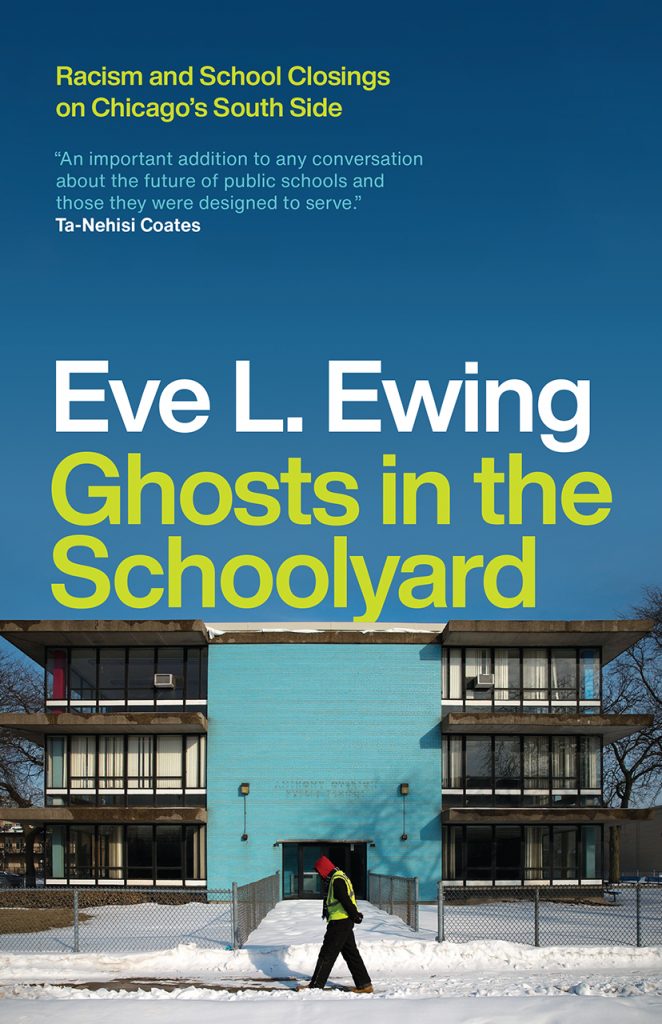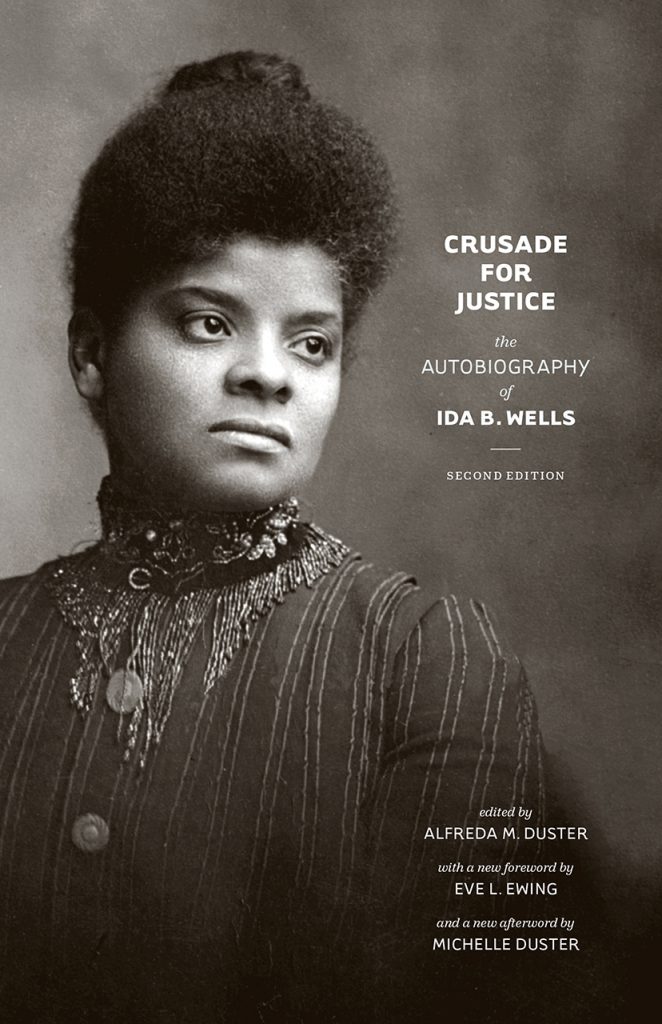Five Questions with Eve L. Ewing
As a book marketer at a university press, one of the things you’re always looking for is a work of strong scholarship that also can connect with ordinary readers and issues that matter in their lives. In the past few years, one of the best examples we’ve had of that is sociologist Eve L. Ewing’s Ghosts in the Schoolyard: Racism and School Closings on Chicago’s South Side. Published in 2018 to broad acclaim—Ta-Nehisi Coates called it “an important addition to any conversation about the future of public schools,” Publishers Weekly called it “essential,” NPR named it one of the best books of the year, and Diane Ravitch called it “the best book about education this year”—the book struck a chord with scholars and activists alike. Earlier this spring, it was published in paperback, and Chicago also released another project that Ewing had a hand in: a new edition of Ida B. Wells’s classic memoir, Crusade for Justice, with a foreword by Ewing.
Those of you who know Ewing from her Twitter feed know, however, that no matter how many projects you name, she’s always up to something more—and that could be anything from publishing poetry to writing comic books. We figured that was probably true even amid a pandemic, so we reached out to her in May to check in with the brief interview below.
As the person in charge of marketing Ghosts in the Schoolyard, I can say that it has been an unqualified success, especially for a first nonfiction book by a scholar early in their career. It was reviewed widely and positively, it sold extremely well, and, perhaps most impressive, it has already made its way into course curricula at universities around the country. Now that the paperback is here, time to look back: Has it been fun? What was the best part of publishing the book?
Wow, thank you! I really didn’t know how the book would be received, so hearing you sum it up in that way has me a bit flabbergasted. I’m so thankful for everyone who has read it and shared it, thankful to bookstores and librarians for carrying it, and thankful in particular to educators who assigned it. Going on tour with this book was . . . I would call it something a bit beyond fun. Inspiring is probably the word I would use. The book has catalyzed so many conversations with incredible people around the country (and technically the world, since I did an event in Paris) who are using the things I wrote about to launch their own questions about the places they live, their vision for an educational future, reckoning with uncomfortable histories. That’s been incredible to see.
Ida B. Wells, the pioneering journalist and civil rights activist, seems to be having a moment—if a bit belatedly. A Chicago street was named after her last year, and last week the Pulitzer committee honored her legacy with a Pulitzer Prize. Meanwhile, we have just reissued her classic autobiography with a new foreword by you. What’s it like to be asked to introduce Wells’s life and work to a new audience?
I can’t believe I got to write that foreword and be in conversation with someone who is such an inspiration to me. And, of course, she was a resident of Bronzeville. Her work is still speaking to us today because she was dedicated to finding the facts about anti-Black violence even when doing so meant literally putting her life on the line. She has much to tell us about the cost of freedom, about grassroots organizing, and about speaking truth to power.
While trying to stay away from the “Shakespeare wrote King Lear during a plague!” kind of productivity brags, I can’t help but ask: What have you been up to during the lockdown? Any activity or piece of culture that’s been particularly effective at taking your mind off things?
I have been feeling hyper-aware of my privileges because there are many material supports and circumstances that allow me to keep working during this time. I have a safe and comfortable place to live with a partner that I love and even like, I receive a salary, I have healthcare access including access to mental health care, and I can access green space. I am immunocompromised so I do have to be very careful, but I try to begin and end each day by counting these blessings and considering what it looks like to support people who do not have these things. I am a person who dives headfirst into work as a way of pretending like everything is normal and managing my own anxiety, so I have been writing, working on research projects, and managing household things as well as finding time for some baking, cooking, and playing music. In my regular life, travel and public events take up a lot of bandwidth, so I have been able to get some of that time back and it’s been nice to have a different rhythm, but I am also reflecting on what it means for the sustainability of my life if it took the cessation of all normal business for me to do basic things like work an 8-hour day and have a weekend.
Have you been teaching this spring? If so, how has the shift to remote classrooms worked? Have you learned anything about your teaching style or your students through this process that could make it more effective?
I’m not teaching this spring, but I am currently planning a summer course. I’ve been trying to get as much information and insight as I can from folks who have been doing it for the last two months, and I’m learning a lot. One of the biggest adjustments for me is the readings I’m assigning. I usually assign a lot of reading and a lot of books (sorry, not sorry) but I’m pivoting to only assigning books that are available in full as ebooks through the library system so that my students don’t have to worry about costs or shipping. That means saying goodbye for now to some old friends that I’m used to teaching, but also learning about some new texts.
You should never ask an author this, but I can’t help it: What’s your next book project?
I’m never mad at this question. My next book is a novel for young readers, called Maya and the Robot. It’s about a girl whose best friend is a robot. And I’m sorry to have to tell you that I think it might be the best thing I’ve ever written. Everything is weird in publishing right now but it should be out next year, with Kokila Books, an imprint of Penguin Random House. And I’ve been working on a couple of other book projects since being home for the last two months but I’ll keep those under wraps for now.
Finally: You and I can never talk without taking a minute to chat about comics. Comics publishing is on hold right now—one of the last issues I bought before the big publishers stopped printing was a story written by you about Marvel’s young superhero team the Champions that was supposed to launch a big cross-title story that, alas, is currently in limbo. I imagine it’s pretty tough right now for creators and shops. It’s also tough for readers—I miss my weekly visit to get new comics. How have you been getting your fix? Reading old comics collections? Jotting down your ideas for superhero stories in a secret notebook to draw on later?
I probably shouldn’t admit this publicly, but it just makes me really sad to read comics right now, so I haven’t been doing it, ever since we paused work on Champions. It makes me too blue. I actually have a hard time reading most things that I usually love. I’ve been reading a lot of cookbooks! So infer from that what you will. Although I did finish the audiobook of Educated by Tara Westover which is just as phenomenal as everyone says it is, and I’m listening to Sam Irby’s new book Wow, No Thank You. But I’m looking forward to writing and reading comics again some day.

